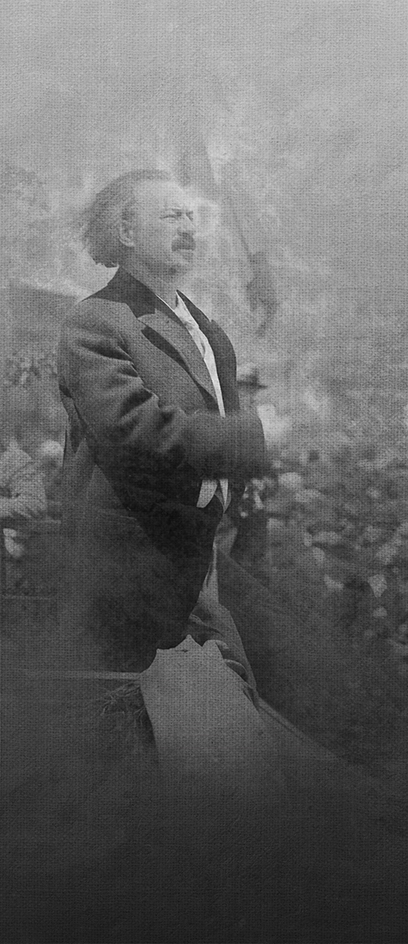
Ignacy Paderewski
pianist, composer, politician and independence activist
(born on 06.11.1860 in Kuryłówka, died on 29.06.1941 in New York, USA)
Each person should be aware of the fact that good and sustainable results can only be achieved through brief, but continuous daily efforts. A one-time effort is completely sterile. The real skill, both in science and in art, and in any other area, can only be obtained by daily work and daily efforts. And that is absolutely certain – from Ignacy Jan Paderewski's Diaries
Paderewski, as not many public figures, was able to combine several different functions in a fluent and efficient way. His musical fame did not hinder his community and political work. For a time, the famous pianist even held a role of the Prime Minister of the Polish government.
Paderewski received his music education at the Warsaw Institute of Music. He graduated with honours, but that did not help him find a job. For a long time he remained a starving artist – earning his living by giving piano lessons and playing during special events. His life situation was made more difficult by his wife's death (Paderewski became a widower at the age of 21) and the need for taking care of his disabled son.
Looking for growth opportunities, the musician went abroad. In Berlin he established valuable relationships. With the support of the famous actress Helena Modjeska, he obtained funding for further education. In Vienna he met a master of the piano Theodore Leszetycki, under the supervision of whom he honed his skills.
In 1888 Paderewski appeared before a larger audience in Paris. The concert was the pianist's unprecedented success and gave him the reputation of a desired musician in the salons and on the great stages of Europe. In 1890 the British Queen Victoria herself listened to the performance of the master at Windsor castle.
On the wave of his popularity, Paderewski journeyed to the United States, where in the years 1891-1892 he went on his grand tour. After a few years - as a millionaire and a world-class artist – he remarried and settled permanently in Switzerland.
Despite the great fame, the pianist shunned comfortable life. He was known for his philanthropy and political work. He was involved, inter alia, in helping his fellow countrymen during World War I, being a strong advocate of Poland's independence.
In 1915 Paderewski founded the Swiss General Committee in Support of Victims of War in Poland, and two years later met with US President Woodrow Wilson, asking him to support the reconstruction of the country. In December, 1918 he arrived in Poznań, where he was greeted by crowds. His appearance in Poznań Hotel Bazar gave rise to the Wielkopolska Uprising - the only Polish armed uprising which ended with a success.
In the inter-war period, Paderewski was trying to mediate between warring politicians. In 1919 he served as foreign minister and prime minister. During World War II he joined the government in exile. His contribution to the war was hampered by a progressive lung disease.
Ignacy Paderewski died in the USA in 1941. In 1992 his body was brought to the Metropolitan Cathedral of St. John in Warsaw. The musician was posthumously awarded the Order of Military Virtue - the most important Polish military award.
---
Do you know?
- During his first stay in the US, Paderewski suffered a serious injury to his hand. This even threatened the end of a career in music. He returned to health with the help of a pioneer of the German surgery, Friedrich Lange.
- Paderewski's most famous works include, among others, Polonia Symphony, Fantazja Polska for piano and orchestra and small piano miniatures - Minuet in G major, Op. 14 No. 1, Melody op 8th and Nocturne op. 16.
- In 1901 the pianist composed his only opera, Manru. It received positive critical acclaim. It was staged in operas in Dresden, Lviv and New York.
- Warsaw monument to Ignacy Paderewski was to be unveiled in September 1939. The plans were thwarted by the outbreak of the war. The monument survived, and smuggled our in a haystack and hidden in a shed at the Bródno cemetery. After the war, it changed its location a few times, until finally in 1985 it was set at the entrance to park Ujazdowski. Skaryszewski Park, where the monument was to be originally placed, houses the bust of the musician.






